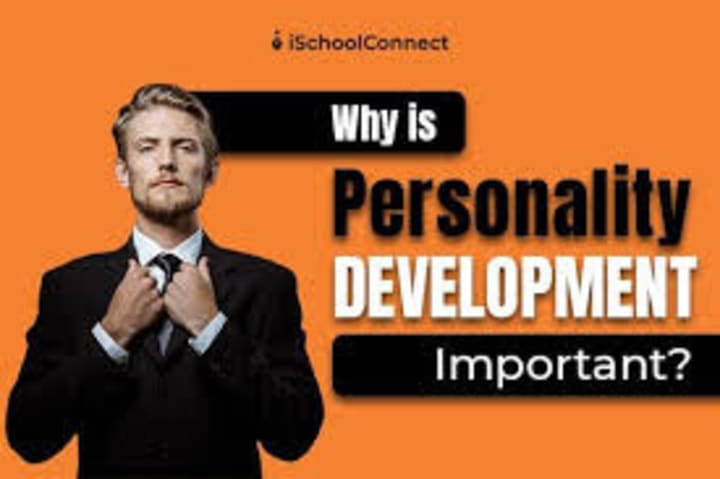Personality Booster
What is personality, how you groom your personality


Introduction:
Personality is a complex set of characteristics, beliefs, and behaviors that define an individual. It encompasses various traits, including emotional patterns, interpersonal skills, social norms, and cognitive styles. The concept of personality has fascinated psychologists, philosophers, and scientists for centuries, and there have been numerous theories and studies attempting to explain it. However, there is no single definition or model of personality, and it remains one of the most elusive and multifaceted constructs in psychology.
Grooming your personality means improving your personality traits and behaviors to enhance your interactions with others, achieve personal growth, and succeed in different aspects of life. It involves self-reflection, self-awareness, and self-improvement through various techniques, such as practicing positive self-talk, developing new habits, setting goals, and seeking feedback.
In this essay, we will explore the concept of personality in more detail, the different approaches and models used to understand it, and how to groom your personality to become a better version of yourself.
What is Personality?
Personality is a dynamic and multifaceted construct that encompasses a broad range of characteristics, behaviors, and traits that define an individual's unique identity. It shapes our thoughts, emotions, and behaviors, influencing how we interact with others, cope with challenges, and perceive the world around us. Personality traits are relatively stable over time, but they can change and evolve through various experiences and interventions.
Personality traits can be divided into different categories, including:
1. Emotional patterns - this includes the range and intensity of an individual's emotions, their emotional stability or instability, and their ability to regulate their emotions.
2. Cognitive styles - this includes an individual's thinking patterns, problem-solving skills, and learning strategies.
3. Interpersonal skills - this includes how an individual communicates and interacts with others, their ability to build relationships, and their level of empathy and compassion.
4. Social norms - this includes an individual's adherence to cultural and societal expectations and values, including religious and ethical beliefs.
Theories of Personality:
There have been various theories and models proposed to explain the concept of personality. These include:
1. Trait Theory - This theory posits that personality consists of a set of relatively stable and enduring traits or characteristics that are consistent across situations and over time. Trait theory assumes that individuals have unique combinations of traits that determine their behavior and that these traits can be measured using standardized instruments such as the Big Five Personality traits (openness, conscientiousness, extraversion, agreeableness, and neuroticism).
2. Psychoanalytic Theory - This theory was developed by Sigmund Freud and posits that personality is shaped by unconscious motives and conflicts that are rooted in childhood experiences. According to this theory, the mind is divided into three parts: the id (the primitive and instinctual part of the mind), the ego (the rational and conscious part of the mind), and the superego (the moral and ethical part of the mind).
3. Humanistic Theory - This theory emphasizes the importance of self-awareness, personal growth, and self-actualization in shaping personality. It posits that individuals have an inherent desire to realize their full potential and that personality is shaped by the extent to which individuals can fulfill this desire.
4. Behavioral Theory - This theory posits that personality is shaped by environmental factors and that behavior is learned through reinforcement and punishment. According to this theory, personality can be modified through behavior modification techniques such as positive and negative reinforcement.
5. Cognitive Theory - This theory posits that personality is shaped by an individual's thoughts, beliefs, and attitudes, and that these cognitive processes can be modified through cognitive restructuring and other cognitive-behavioral techniques.
Grooming Your Personality:
Grooming your personality involves a process of self-reflection, self-awareness, and self-improvement to enhance your traits, behaviors, and interpersonal skills. The following are some tips and techniques that can help you groom your personality:
1. Practice self-reflection: Take time to reflect on your thoughts, emotions, and behaviors regularly. This can help you identify areas of improvement and develop a better understanding of yourself.
2. Develop self-awareness: Be aware of your strengths, weaknesses, values, and beliefs. This can help you make better decisions and enhance your interpersonal skills.
3. Set goals: Set specific and achievable goals for yourself. This can help you focus your efforts and motivate you to work towards personal growth.
4. Develop new habits: Identify habits that are holding you back and work on developing new habits that align with your goals and values. This can help you change your behavior patterns and enhance your personality.
5. Seek feedback: Ask for feedback from people you trust and respect. This can help you identify blind spots and gain insights into how others perceive you.
6. Practice positive self-talk: Use positive affirmations to boost your self-confidence and self-esteem. This can help you overcome self-doubt and improve your interpersonal skills.
7. Be open to learning: Be open to new experiences and learning opportunities. This can help you develop new skills and perspectives, which can enhance your personality.
8. Practice empathy: Practice empathy and compassion towards others. This can help you develop better interpersonal skills and build stronger relationships.
9. Manage stress: Develop healthy coping mechanisms for managing stress. This can help you maintain emotional stability and enhance your personality.
10. Seek professional help: If you are struggling with mental health issues or personality disorders, seek professional help. A mental health professional can provide you with the support and guidance you need to overcome these challenges and improve your personality.
Conclusion:
Grooming your personality involves a process of self-reflection, self-awareness, and self-improvement to enhance your traits, behaviors, and interpersonal skills. It requires effort and commitment, but the benefits of grooming your personality are numerous, including personal growth, better relationships, and success in different aspects of life. By practicing the tips and techniques mentioned above, you can groom your personality and become a better version of yourself.
About the Creator
Khalid Kamil
I am Khalid Kamil and I am Analyst. As an analyst I am a professional who uses data and research to make informed decisions and recommendations for an organization or business. Which are typically required for this role.






Comments
There are no comments for this story
Be the first to respond and start the conversation.